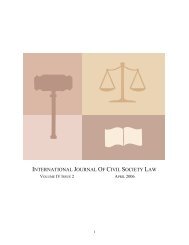SECURED VERSUS UNSECURED CREDITORS â BASIC TERMS
SECURED VERSUS UNSECURED CREDITORS â BASIC TERMS
SECURED VERSUS UNSECURED CREDITORS â BASIC TERMS
Create successful ePaper yourself
Turn your PDF publications into a flip-book with our unique Google optimized e-Paper software.
B. Types of Secured Claims and Liens:<br />
1. A voluntary lien or security interest is created by contract.<br />
2. The contract creating a security interest in personal property is a typically referred to as a<br />
security agreement. The security agreement identifies which property is subject to the security<br />
interest.<br />
3. There are three requirements for a security interest to be effective between the creditor<br />
and the debtor: (a) the debtor must have signed a security agreement; (b) the creditor must have<br />
provided value/credit to the debtor; and (c) the debtor must have rights in the collateral.<br />
4. When the foregoing three requirements are satisfied, the security interest has attached to<br />
the collateral.<br />
5. For a security interest to be effective against other creditors of the debtor, it must be<br />
perfected. A security interest is most often perfected by the filing of a filing statement with the<br />
appropriate state recording office. When the debtor is an enterprise organized under state law<br />
(i.e., a corporation or limited liability company or limited liability partnership), the filing<br />
statement is properly filed with the recording office of the state of the debtor’s organization,<br />
without regard to the location of the collateral.<br />
6. A judicial lien is an involuntary lien created as part of the process of collecting a<br />
judgment.<br />
7. A statutory lien is an involuntary lien created by statute or under the common law to<br />
protect a specific type or class of creditor. Examples of statutory liens are landlord liens for<br />
unpaid rent; tax liens for unpaid taxes; and mechanics’ liens for unpaid goods and services<br />
provided to real estate projects.<br />
8. A purchase money security interest (“PMSI”) is a security interest granted to secure the<br />
repayment of the loan used by the debtor to acquire the collateral. A non-PMSI is a security<br />
interest granted in property which the debtor already owns.<br />
8. A voluntary lien in collateral has priority over the debtor’s right under state law to<br />
declare the property as exempt. Involuntary liens in collateral are typically subordinate or junior<br />
to the debtor’s rights to declare the property in question as exempt.<br />
9. State law exemption is typically ineffective

















